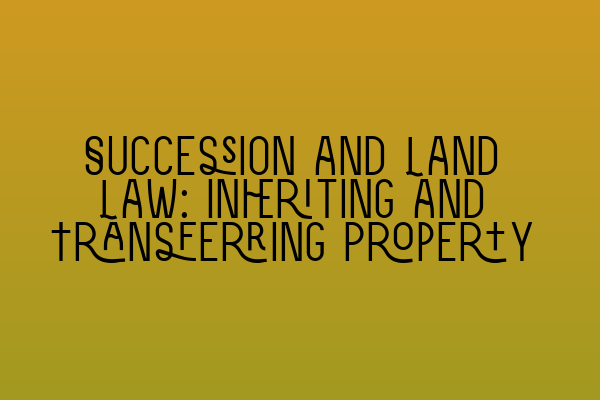Succession and Land Law: Inheriting and Transferring Property
Welcome to the SQE Property Law & Land Law blog! In today’s post, we will dive into the fascinating topic of succession and land law, specifically focusing on inheriting and transferring property. Whether you are a solicitor, aspiring lawyer, or simply interested in expanding your knowledge of property law, this article will provide you with valuable insights into this crucial area of expertise.
Before we delve into the nitty-gritty details, let’s briefly understand the concept of succession and its importance in property law. Succession refers to the legal process by which the ownership of property passes from one individual to another upon the death of the property owner. It ensures that property rights are properly transferred and safeguarded, promoting stability and continuity in the ownership of assets.
Now, let’s explore the different ways in which property can be inherited or transferred:
1. Intestacy
When a person dies without leaving a valid will, the rules of intestacy come into play. Intestacy determines how the deceased’s property is distributed among their surviving relatives according to a predetermined legal order of priority. It’s essential to understand the rules of intestacy to effectively assist clients in the case of a death without a will.
2. Wills and Testamentary Dispositions
A will is a legal document that outlines how a person’s property should be distributed upon their death. It allows the deceased to control the destiny of their assets and ensures that their wishes are respected. As a property law expert, it is crucial to have a sound understanding of the rules surrounding wills and testamentary dispositions to help clients draft valid and enforceable wills that accurately reflect their intentions.
3. Transfers during Lifetime
In addition to inheritance through intestacy and wills, property can also be transferred during a person’s lifetime. This can be done through a variety of legal mechanisms such as gifts, sales, leases, and mortgages. Each type of transfer requires careful consideration and compliance with relevant legal requirements to ensure the legality and validity of the transaction.
Navigating the intricacies of succession and land law requires a deep knowledge of relevant legislation, case law, and legal principles. As a solicitor specializing in property law, it is essential to remain up-to-date with any changes or reforms to the law that may impact your clients’ rights and responsibilities.
At SQE Property Law & Land Law, we are dedicated to providing expert guidance and insights into the ever-evolving landscape of property law. To enhance your understanding of related legal topics, we invite you to explore the following articles:
– Understanding Contractual Capacity: Rights and Limitations
– Interactive SQE Mock Tests for Contract Law: Test Your Knowledge
– Join Our SQE Contract Law Webinars: Expert Insights and Guidance
– Contract Law Reforms: An Analysis of Recent Changes
– Parties in a Contract: Rights and Responsibilities
These articles provide valuable information on various legal aspects that complement your understanding of succession and land law.
In conclusion, inheritance and property transfers are integral components of succession and land law. As a solicitor specializing in this area, it is essential to have a robust knowledge base to effectively advise clients on matters related to inheriting and transferring property. Staying informed about the latest developments and legal principles is vital to providing excellent legal services.
We hope this blog post has given you valuable insights into the fascinating world of succession and land law. If you have any questions or would like to explore this topic further, please don’t hesitate to reach out to the team at SQE Property Law & Land Law. We are here to support you in your journey towards expertise in property law.
